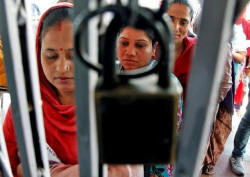|
India to use indelible
ink to ensure people change cash only once
 Send a link to a friend
Send a link to a friend
 [November 15, 2016]
By Neha Dasgupta and Promit Mukherjee [November 15, 2016]
By Neha Dasgupta and Promit Mukherjee
NEW
DELHI/MUMBAI (Reuters) - Indian banks will use indelible ink to ensure
that people only change old notes for new ones once under Prime Minister
Narendra Modi's scheme to fight "black money", resorting to a tactic
used to prevent multiple voting in elections.
The step comes a week after Modi ordered the withdrawal of large
denomination banknotes from circulation, in a shock "demonetization"
drive to fight tax evasion, corruption and forgery.
The government only gave people a few hours notice before cancelling old
500 and 1,000 rupee banknotes that accounted for 86 percent of cash
circulating in Asia's third-largest economy.
The sudden move has caused huge disruption to daily life, especially for
poor people who live in the cash economy.
There were lengthy queues at banks in New Delhi and Mumbai as people
waited in hope that cash dispensers would be refilled.
But people going about their daily business in the country's two biggest
cities said they were willing to put up with the hassle - as long as it
doesn't last too long.
Hari Kishan, who runs a clothing stall in Delhi's bustling Karol Bagh
district, said his business normally turns over up to 60,000 Indian
rupees ($900) a day but was making just a sixth of that now.
"People will forget all this inconvenience. When currency returns, by
December, the situation should normalize," said the 40-year-old
merchant. "Credit has to go to the prime minister."

STATE ELECTION ISSUE
A top finance ministry official said the use of indelible ink - also
used to stop multiple voting in Indian elections - would prevent
"unscrupulous persons" from sending people from one bank branch to the
next to exchange old notes. Individuals are allowed to swap 4,500 rupees
($66.50) just once.
"You find the same people coming back again and again," Economic Affairs
Secretary Shaktikanta Das told a briefing, saying huge queues were
preventing honest people from getting the cash they need.
Campaigning to win power in 2014, Modi had pledged to flush out
corruption by forcing people to bring their hidden money back into the
system.
And with an important state election just months away, he is again
campaigning to justify the demonetization drive.
"After demonetization, the poor are enjoying a sound sleep while rich
are running from pillar to post to buy sleeping pills," he told a rally
on Monday in Uttar Pradesh, which goes to the polls next spring.
[to top of second column] |

Women queue outside a bank to exchange and deposit their old high
denomination banknotes in Chandigarh, India, November 15, 2016.
REUTERS/Ajay Verma

Opposition politicians have rounded on Modi, accusing him of tipping off
workers from his Bharatiya Janata Party (BJP) and creating an unfair
campaign advantage. Party leaders have denied any such leak.
Modi's black money drive is expected to dominate the reopening of
parliament for its winter session on Wednesday and he was due to attend
an all-party meeting later in the day to discuss the matter.
Economists say the cash crunch will cause a short-term hit to activity,
mainly because a significant chunk of old money will be wiped out and it
will take time to print and circulate new 500 and 2,000 rupee notes.
The purple 2,000 rupee notes are smaller that India's existing
banknotes, and it also will take up to three weeks to reconfigure the
country's 200,000 ATMs to handle them.
In a blog post, N.R. Bhanumurthy of the National Institute of Public
Finance and Policy estimated that growth could be depressed by 0.6 of a
percentage point in the current fiscal year to March 2017.
But an increase in bank deposits and the "multiplier" effect of that
money being re-lent, could lift growth in 2017/18 by up to 0.7 of a
percentage point, estimated Bhanumurthy, whose think tank is affiliated
to the finance ministry.
(Additional reporting by Manoj Kumar; Writing by Douglas Busvine;
Editing by Malini Menon and Simon Cameron-Moore)
[© 2016 Thomson Reuters. All rights
reserved.] Copyright 2016 Reuters. All rights reserved. This material may not be published,
broadcast, rewritten or redistributed.
 |